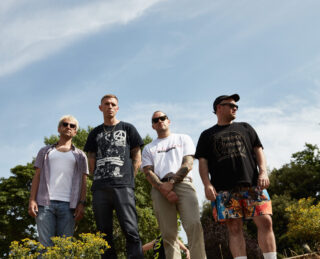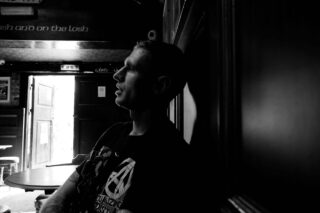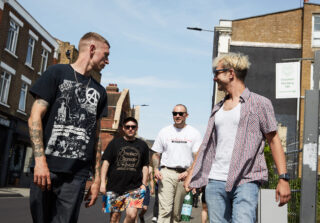DIY punks High Vis: “It’s shit, but we’ll get through it”
A DIY punk band who've put in the "fucking hard work"

A DIY punk band who've put in the "fucking hard work"
It might have just gone lunchtime, but the Auld Shillelagh already feels like a furnace. Making my way inside the Stoke Newington pub, the two patrons sitting by the bar look as if they’re wilting; they wipe beads of sweat from their sets and sigh impatiently as the bar person waits to top up their drinks. I find High Vis singer Graham Sayle sitting towards the back. Unlike everyone else, he seems almost un-bothered by the temperature. Having spent the night at an NTS party near his home on Gillett Square, he simultaneously nurses a Guinness and a pint of coke. “It was a good night,” he says, smiling almost apologetically, “but I’m starting to feel it now.”
One by one, the rest of the band appear, grab drinks from the bar and join us at the table. As a group of people, High Vis are a diverse bunch. Sayle, with his calm, thoughtful Liverpool accent, cuts a very different figure to drummers Edward ‘Ski’ Harper and guitarist Rob Hammeren’s urgent Guildford tones or second guitarist Martin McNamara’s broad Southern Irish brogue. The one thing that they have in common is music. The band’s roots lie in London’s hardcore scene, a place that is going gangbusters right now. From the distinctively blue-collar sound of Chubby and the Gang to the more internet-inspired Powerplant, I don’t think there has been a time in recent history where so much variety has existed in UK punk.
“London’s always had its own thing going on,” says Sayle, flashing a gold-toothed smile when I ask about his experiences on the frontline of the capital’s hardcore scene. Moving to the city from Liverpool in the early 2010s, he’s witnessed the scene’s evolution over the past decade. “People tend to see hardcore as intimidating or unwelcoming, but on the inside, it’s not. I’ve always found that people have always been open to all sorts of different stuff because hardcore is just a set of rules we impose on ourselves. It’s down to you; if you want to break the framework, people will still accept it. Hardcore kids usually go with anything; they’re much harder to scare than most other people.”
Yet, even among a crop of bands falling over each other to push the genre as far as it can go, High Vis is a bit of an anomaly. It’s not only their music, a frankly out-there melding of Judge style Youth Crew, Sisters of Mercy-like goth and ’90s Britpop but also their outlook that balances the positive vibes of ’90s hardcore with a more kitchen-sink sense of social realism.
High Vis never set out to mix Factory Records and Cro-Mags, though; it’s just kind of happened that way. When I ask them about the inspirations behind the sound, the band just glance at each other and shrug. “It definitely isn’t anything self-conscious; we didn’t set out to be cool or have a really distinctive sound,” offers Hammeren eventually, still looking at his bandmates for validation. Getting a collective nod, he continues, “I think we’ve always been more concerned with the idea of playing music that comes from the heart. We’ve always believed that if the music sounds good, then it doesn’t matter where it comes from.”
“A lot of hardcore comes from just one emotion, and that emotion is anger”, agrees Sayle, jumping in. “It’s quite easy to hide behind that and say, ‘This is me; I’m angry all the time and not get any deeper.’ That’s fine, but ultimately when you start delving into the reasons why you’re so angry, you start needing to find other ways to express yourself. That’s where some of this comes from, a need to bring other elements into the mix to be able to explore other ideas. It’s quite alien, and it’s quite scary, but personally, I think it’s a place that I needed to go to.”

As with so many punk bands, the seeds of High Vis are to be found in the demise of previous punk bands. In this case, the story starts at the end of Dirty Money, an old-school, politically-aware thrash hardcore band that featured Sayle as its lead singer. It was via one of the band’s tours in Germany that Sayle met Ski, a drummer and songwriter who was working on a new set of more gothy, post-punk-inspired songs and in need of someone to croon over the top. “At first, I was like ‘You what?’, laughs Sayle recalling the moment his bandmate pitched the idea to him. “But thinking back, it was clear I was looking to do something that wasn’t just hardcore. Back then, I didn’t really know what it was, but as it turns out, it was this.
“You know what? That’s what’s been really nice about it,” adds Ski. “I feel like the best music comes from people who don’t know what they’re doing; it means that you’re always on edge and finding things out as you go – you almost have to toe this line and play with a different level of energy or intensity. Doing this has forced all of us out of our comfort zones; none of us was fucking comfortable playing this type of music at the beginning.”
High Vis’s 2019 debut No Sense No Feeling captures the band in its early days. Determined not to be constrained by self-imposed genre rules and regulations, the record instead saw the band incorporating a range of other influences, producing a claustrophobic, almost paranoid collection of songs. Bearing traces of Bauhaus, The Cure and UK Subs, a style that Sayle describes as ‘post-industrial misery punk’. Written in the various members’ bedrooms and on a diet of the Chromatics, the Wipers and a parade of never-ending culture wars courtesy of the British government, it has a decidedly more frosty sound than the band has nowadays.
“A lot of those songs were written right at the start of the band, when we were still trying to figure things out,” says Hammeren as the band conducts an impromptu post-mortem on the record. “The period between 2016 and 2019 felt like such a chaotic time, and I think some of that got reflected onto the record. That’s probably the big reason why we ended up sounding so miserable.”
“I think we were really anxious, making that record; we weren’t really sure if we were doing the right thing or not,” adds Ski. “I think that’s why when you listen to it, the record sounds the way it does, it’s like manifesting our anxiety and stress.”
“That’s true,” Hammeren nods. “I think we have a lot more swagger these days.”
“You can’t say that you’ve got swagger!” chimes Sayle, affecting a pitch-perfect air of false outrage. “Other people can say that you’ve got swagger, but you can’t say it.”
Unfortunately, timing has not been High Vis’ friend. With No Sense No Feeling released in December 2019, the band played just a couple of shows before the whole world was shut down by coronavirus. Even though Ski and Sayle managed to get back into the studio in 2020 and recorded the excellent synth-driven Society Exists EP, when the band talk about their early experiences, it’s hard not to detect a lingering sense of frustration. “I can remember playing one show at The Social and it going off,” recalls MacNamara. “I was thinking, ‘This is fucking sick, it’s really taking off’, and the day after, we went into lockdown. It was like, ‘Thanks, life.’”
Despite an enforced period of inactivity, the pandemic doesn’t appear to have halted High Vis’ trajectory. As soon as it was safe to get back out there, the band started playing gigs, and they have built a solid rep as one of the UK’s most fearsome live acts. As with all the best punk acts, High Vis are at their sharpest when they’re on stage. Over the past twelve months, the band has developed a devoted following mainly due to a string of intense, small-venue gigs and a relentless live show that they’ve fined-tuned through relentless practice and attention to detail.
“It’s been fucking hard work, let me tell you,” explains Ski. “Sometimes we’ve played to one person and a dog, and the dog hated it, but we’ve all felt like it’s something that we need to do.”

Like everyone else, High Vis aren’t the same people they were before the pandemic. Blending, the band’s forthcoming new album, sees the band moving even further away from the hardcore blueprint. The first record that the whole band has worked on, this album finds the band throwing caution to the wind and embracing an ever-widening range of textures, stylistic flourishes and structures. Whether it’s the warm glow of ‘Shame’ or the lazy, almost C86-esque jangle of ‘Trauma Bonds’, this record is High Vis truly beginning to sound like themselves, fusing the street-wise punk of the capital’s punk scene with the psychedelic haze and melodic pop that typifies the North West’s indie scene. It could be the world’s first flower-core record.
Discussing the story behind the record, Sayle eagerly spells out how the roots of this new sense of direction connect to the aftermath of the band’s debut album. “No Sense No Feeling was a bit of an anti-climax, coming out when it did. We just thought no one listened to it, and though ‘Oh well, we’ve done that, let’s move on, and then we didn’t.’ The Society Exists EP accurately depicted where we were at the time; hopeless, miserable, tired. I remember sinking a bottle of Johnny Walker while trying to do the vocals; it was fucking horrible.
“Then, halfway through the lockdown, we started to sort ourselves out,” he continues. “I started talking to people and began to stop being so self-destructive. It was like coming out from under a cloud, where we suddenly could be positive about the future; that’s when we started writing these songs.”
Interestingly, Blending adds dance-like elements to the High Vis formula. Throughout the record, songs build again and again and always feel as if they’re searching for an epic, almost euphoric conclusion. If I didn’t know any better, I’d almost say that the band were mining inspiration from Modjo and Roger Sanchez as much as Black Flag and the Stone Roses. Sayle’s eyes light up when I put this to the band. “Both myself and Ski really love dance music,” he beams. “I’ve always seen punk as a bit of a dirty little secret that I’ve kept separate from all my mates who I go raving with, and I wanted to make something that pushes those two elements together.”
However, Blending still keeps some of the grit and grime of the first record. In all their incarnations, the members of High Vis have gravitated towards a politically-conscious outlook, and this album is no different. The tunes might be more melodic, but the lyrics remain as sardonic as ever, with Sayle speaking frankly about the poverty, class politics and institutional neglect that still blight modern Britain. This time, the anger seems tempered by a sense of perspective and understanding. It’s a remarkable level of emotional maturity not seen on your usual hardcore 12” and delivers a record that can feel almost contemplative at times. A good example is the recent single ‘Talk For Hours’, a track that the band refer to as a sobering reflection on endless conversations without resolution. While the frustration is clearly still there, the song’s warm production and hopeful chord progressions give it a sense of commune. It’s a friendly hug in a song, a mate who says, “Yeah, it’s shit, but we’ll get through it.”
When I ask the band to tell me where they think this new outlook stems from, Sayle puts it bluntly, “I went to therapy.” Upfront about a lifetime of unresolved shame and regret, the singer credits Ski, who recently qualified as a therapist, for pointing him in the right direction. “I think it’s really helped me to reflect on everything; what I want to do, what I want to be known for, what I want to put out into the world. It’s been amazing to finally have this time to think and discover the person I want to be.
“Don’t get me wrong, I’m still working on it, but I’m in such a better place to talk about things,” he says as one of his bandmates hands him another drink. He pauses for a moment, taking a sip. “There’s no finish line, but at least I seem to be heading in the right direction.”